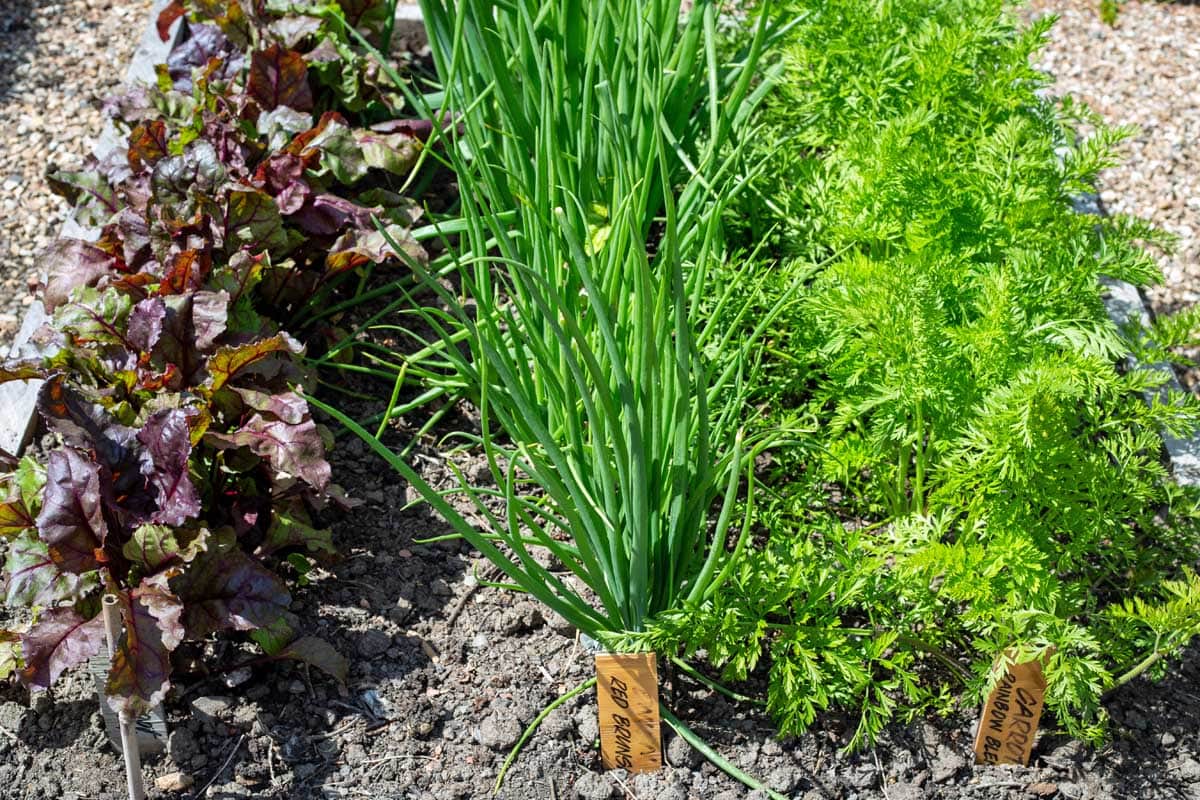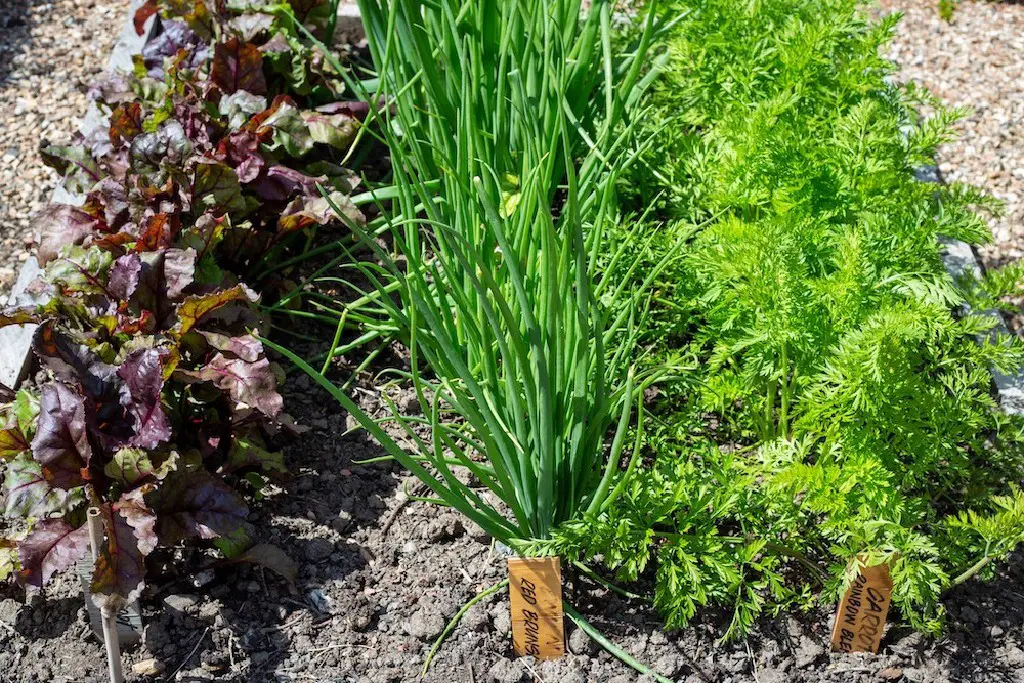Carrots And Basil: The Perfect Companion Planting
Carrots and basil are two popular vegetables that are often grown together in gardens. But did you know that they are also great companion plants? Companion planting is the practice of planting certain plants together in order to benefit each other. In the case of carrots and basil, they have a number of complementary qualities that make them ideal partners.
Carrots
Carrots are a root vegetable that is known for its sweet flavor and crunchy texture. They are a good source of vitamins A and C, as well as potassium and fiber. Carrots are relatively easy to grow, but they can be susceptible to a number of pests and diseases.
Basil
Basil is an herb that is native to Southeast Asia. It is known for its strong, aromatic flavor, which is often used in Italian cuisine. Basil is a good source of vitamins K and C, as well as potassium and manganese. Basil is also a relatively easy herb to grow, and it can help to repel pests from other plants in the garden.
Benefits of Companion Planting
There are a number of benefits to companion planting carrots and basil. Here are a few of the most important:
- Attract beneficial insects. Both carrots and basil attract beneficial insects, such as ladybugs and lacewings. These insects help to control pests that can damage both plants.
- Discourage pests. The strong aroma of basil can help to discourage pests, such as carrot rust flies and aphids. This can help to protect your carrots from damage.
- Improve soil quality. Basil can help to improve the soil quality around carrots by adding nitrogen and other nutrients. This can help carrots to grow better and produce more abundant crops.
- Complement each other's growth. Carrots and basil have different root systems, so they do not compete for resources. This allows them to grow well together without one plant stunting the growth of the other.
How to Plant Carrots and Basil Together
To plant carrots and basil together, you will need to choose a spot in your garden that gets full sun. The soil should be well-drained and rich in organic matter. Prepare the soil by loosening it with a spade or garden fork. Add some compost or manure to the soil to improve its fertility.
Plant the carrots first, spacing the seeds about 2 inches apart. Cover the seeds with a thin layer of soil and water them well. Plant the basil seeds about 6 inches apart. Cover the seeds with a thin layer of soil and water them well.
Water the carrots and basil regularly, especially during dry weather. Fertilize the plants every few weeks with a balanced fertilizer.
Once the carrots and basil start to grow, you can thin them out to give the remaining plants more room to grow. Harvest the carrots when they are about 6 inches long. Harvest the basil leaves as needed.
Conclusion
Carrots and basil are a great combination for companion planting. They complement each other's growth and help to attract beneficial insects. If you are looking for a way to improve your garden's productivity and pest control, consider planting carrots and basil together.
Carrots and basil are two popular garden vegetables that can benefit from being planted together. Basil's strong scent can help to deter pests that target carrots, such as carrot rust flies and carrot root maggots. Additionally, basil can help to improve the flavor of carrots.
If you're interested in learning more about carrots and basil companion planting, I recommend visiting Gardenia Inspiration. This website provides a comprehensive list of companion plants for carrots, as well as detailed information on the benefits of each pairing. You can also find helpful tips on how to plant and care for carrots and basil, so that you can enjoy a bountiful harvest of both vegetables.
FAQ of carrots and basil companion plants
- Are carrots and basil companion plants?
Yes, carrots and basil are considered to be companion plants. They have different growing requirements, so they will not compete for resources. Basil has a strong scent that can help to repel pests that target carrots, such as carrot flies. Additionally, basil can help to improve the flavor of carrots.
- What are some other good companion plants for carrots?
Some other good companion plants for carrots include:
- Celery: Celery can help to repel carrot flies.
- Dill: Dill can help to attract beneficial insects that prey on pests that target carrots.
- Lettuce: Lettuce can help to shade the roots of carrots, which can help to prevent them from being forked or misshapen.
- Marigolds: Marigolds can help to repel nematodes, which are pests that can damage carrot roots.
- Onions: Onions can help to repel carrot flies.
- What are some plants that should not be planted near carrots?
Some plants that should not be planted near carrots include:
- Fennel: Fennel can release a chemical that can stunt the growth of carrots.
- Potatoes: Potatoes can harbor a fungus that can damage carrot roots.
- Sage: Sage can release a chemical that can inhibit the growth of carrots.
- Spinach: Spinach can release a chemical that can make carrots bitter.
- Tomatoes: Tomatoes can attract the same pests that target carrots, such as carrot flies.
- How far apart should carrots and basil be planted?
Carrots and basil should be planted at least 12 inches apart. This will give them enough space to grow and prevent them from competing for resources.
- Can I grow carrots and basil in the same pot?
Yes, you can grow carrots and basil in the same pot. However, it is important to choose a pot that is large enough for both plants to grow comfortably. You should also make sure that the pot has drainage holes to prevent the roots of the plants from rotting.
Image of carrots and basil companion plants
5 different images of carrots and basil companion plants from Pinterest:
- Carrots and tomatoes. Tomatoes are another good companion plant for carrots. They both attract beneficial insects, and the tomatoes' height can help to shade the carrots from the sun.
- Carrots and lettuce. Lettuce is a low-growing plant that will not shade the carrots, and it can help to attract beneficial insects.

- Carrots and chives. Chives are another good companion plant for carrots. They help to repel pests, and their strong aroma can help to mask the carrot's scent, which can attract carrot root fly.

- Carrots and beans. Beans are a nitrogen-fixing plant, which means they can help to improve the soil quality for the carrots. They also help to shade the carrots from the sun.

- Carrots and spinach. Spinach is another low-growing plant that will not shade the carrots. It also helps to attract beneficial insects.

Post a Comment for "Carrots And Basil: The Perfect Companion Planting"